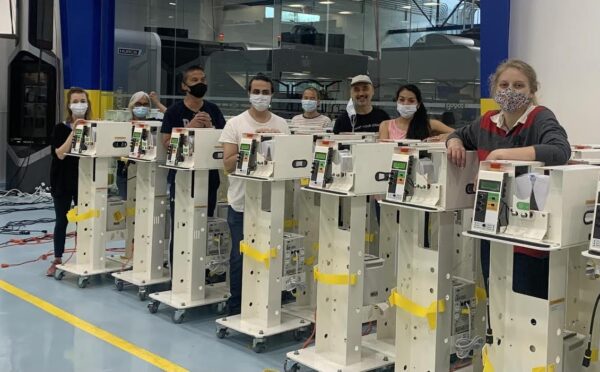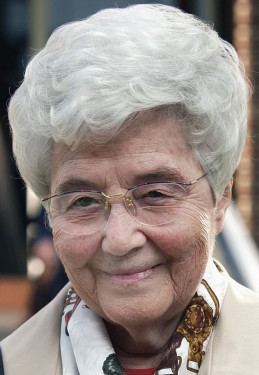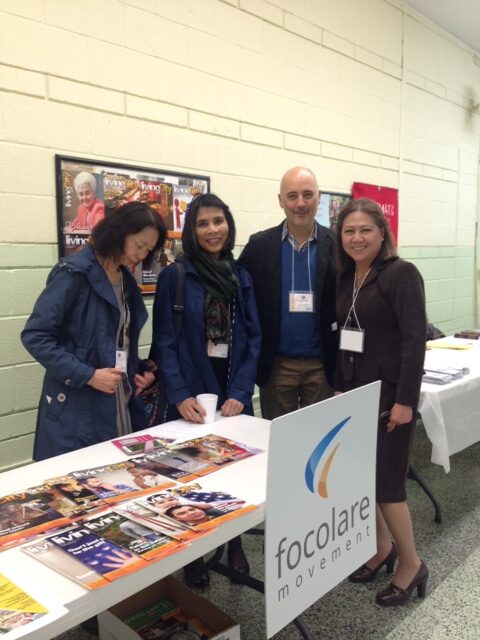
WINDSOR TERRACE — Soon after the COVID-19 pandemic attacked New York City, demand soared for ventilators to help patients breathe. To meet that need, local members of the ecclesial movement Focolare joined assembly lines to build the devices.
Boyce Technologies in Long Island City made the news for how it swiftly and efficiently switched production from communications equipment for subway systems to a completely different product — ventilators.
Paul Catipon, a Focolare member from Harlem, learned through his regular job as a contractor that Boyce needed more assemblers. The company had hired him to help develop equipment for the Metropolitan Transportation Authority of New York City.
Catipon said about a dozen Focolare members — many of them accomplished professionals with advanced degrees — happily volunteered to assemble 3,000 units.
And, Catipon said, they sought no pay for themselves.
“We worked a month and a half every weekend,” he said. “There were lawyers, engineers, teachers, and all we were doing was assembly line work. But we enjoyed it so much. It was relaxing.
“My client wanted to pay us, but we took all that money and donated to COVID relief, about $5,000.”
While Boyce Technologies received due praise from politicians, medical professionals, and the media, the Focolare members preferred to go unrecognized.
“We operate in the background,” Catipon explained.
“We tend to be under the radar a lot,” added Jonathan Wallen, a Focolare leader in Queens.
“It comes in small packages,” said Lyn Ruiz, an organizer in Brooklyn.
Ruiz, like Catipon, immigrated to the U.S. from the Philippines. Wallen is from the United Kingdom. All three learned about the movement in their native lands.
The Focolare lifestyle, however, is the same everywhere.
Related: Focolare Members From Egypt Share Gospel, Urge Unity

By learning the scriptures, followers find ways to be like Jesus, which opens doors to serious exchanges between Catholics and other religions. The result is stronger unity to fulfill John 17:21, in which Jesus prayed for his followers, “so that they may all be one.”
The Focolare members gather weekly in small groups to study the Gospel and discuss ways to express it in the world.
They seek communion with God the Son, as described in Matthew 18:20, in which Jesus said, “For where two or three are gathered together in my name, there am I in the midst of them.”
“Part of what we do, when we get together in groups, is trying to share what we experienced and what we learned from trying to put the Gospel into practice,” Wallen said. “It has been the core of my faith journey.”
Wallen further explained that the Focolare lifestyle rests first on establishing one-on-one relationships with people.
“You go out and do activities as an additional element,” he said.
But during the pandemic, local members did more than assemble ventilators.
Ruiz said local hospitals filled to “100 capacity” soon after the pandemic came to New York City. Supplies of disposable personal protective equipment (PPE) dwindled and had to be rationed among health care workers treating patients on the front lines.
“One of our friends, a nurse, voiced her concern they were running very low on PPE,” Ruiz said. “We said, ‘What do you need us to do?’”
The nurse handed over one of the coveted face covers as an example of what to make. Then the members got busy sewing and ironing masks, Ruiz said.
“One person would bring the fabric, another brought the elastic, and another brought gauze,” Ruiz said. “So it was a bridge [until they could be resupplied], and they were very, very thankful.”
They also delivered food to quarantined people and conducted funerals — sometimes through video conferencing — for people who died but had no family or friends to mourn them, Ruiz said.
This work is consistent with the character and teachings of the Focolare Movement’s founder, Chiara Lubich, born 100 years ago in Northern Italy. She died in 2008 at age 88.
Pope Francis recognized her cause for sainthood in 2015. It has since moved to the Congregation of the Cause of Saints at the Vatican.
Chiara and The Work of Mary
Lubich was born in Trent, a city nestled in the Italian Alps. There, in her early 20s, she became a school teacher. But in 1943, allied bombers targeted occupying Nazis and, consequently, pummeled her city.
As Lubich sheltered during the raids, she resolved to replace the violent chaos, hatred, and destruction of war with spiritual and social renewal, expressed by a “new people born of the Gospel.”
Lubich thus became a champion for unity among believers and an active leader in ecumenical exchanges among people of diverse religions, races, and cultures.
Focolare is actually the movement’s nickname. The word in Italian means “hearth,” and results from the imagery of members gathered around a warm fire to discuss the Gospel and how to demonstrate it in the world. The official name, however, is “The Work of Mary.”
“For us,” Catipon said, “the Marian Profile is to be like Mary, staying in the background, helping, organizing, trying to give Jesus to the world.”
Focolare came to the U.S. in 1961, planting its North American headquarters at Hyde Park, N.Y., about 90 miles north of New York City.
In 1997, Lubich’s visit to the Masjid Malcolm Shabazz Mosque in Harlem drew wide attention as she shared the Gospel and drew similarities between Christianity and Islam. In so doing, she forged enduring friendships with Muslims, Catipon said.
“Since then,” he added, “that mosque has had a really strong friendship with the Focolare.”
It’s like water
Local members say the movement doesn’t keep strict membership records. The Vatican, however, has estimated that 4.6 million people worldwide follow Focolare. Included are Roman Catholics, members of other faiths, and people who don’t claim membership to any particular religion. Wallen, for example, is Episcopalian.
Focolare is counted among ecclesial movements recognized by the Diocese of Brooklyn.
Its growth since 1943 has been organic — no major publicity campaigns — just relying on person-to-person exchanges. But Ruiz estimated there are well over 100 members in the New York City metropolitan area. She noted that 120 people attended a recent Mariapolis (City of Mary) conference.
“And those were the ones who were able to attend,” she said. “It’s like water; it is fluid. It could be more.”
And their work continues. Sometimes helping others isn’t easy — until one looks at another and sees Jesus in that person, Ruiz said.
“So I see Jesus here, the suffering Jesus, in front of me,” she said. “It becomes even more meaningful.
“But it’s not like we go out there to do something big every time. We do our work one person at a time, and one need at a time. We are in the background.
“This is where we build unity, not to convert people, but to accept them the way they are.”


This is a wonderful example of putting Love into a concrete experience. Thank you for your example. It’s inspiring to say the least.